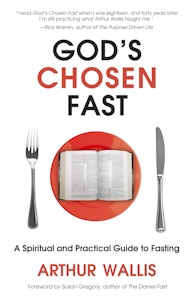Introductory Note:
We may already be convinced of “the rightness and need of fasting,” and have a willing spirit, but there is yet another component to consider if we are going to fast in the way of Jesus. We must surrender our fasting agenda to the direction of God. Arthur Wallis writes, “When we fast, how long we fast, the nature of the fast, and the spiritual objectives we have before us are all God’s choice, to which the obedient disciple gladly responds.”
This flexible, surrendered approach to spiritual disciplines will help ground us when circumstances cause our rhythms to unravel, or when our motivation gets tangled up. We can find stability by simply returning to our Master Teacher in a listening posture, ready to practice (or not practice) as he leads.
Renovaré Team
 Excerpt from God's Chosen Fast
Excerpt from God's Chosen Fast
When ye fasted… did ye at all fast unto me, even to me? —Zechariah 7:5.
They ministered to the Lord, and fasted. —Acts 13:2.
“Fasting today! Whatever is to be gained by that?” is the incredulous question of many Christians. If they mean, “What does one personally gain by fasting?” then there are many answers that may be given, and will be given in this book, but there is a more important question to answer first.
So much of our thinking is ruled by that self-centered principle, “What do I get out of it?” Even in our spiritual desires and aspirations self may still be enthroned. The cross must work in us if the life is to be centered in God. Only so can our spiritual motivation be radically altered and become Christward instead of self-ward. “He died for all, that they which live should no longer live unto themselves, but unto him” (2 Cor.5:15, R.V.).
Even in circles where fasting is accepted as a normal spiritual exercise there is often so much emphasis on fasting for personal benefit, for the enduement of power, for spiritual gifts, for physical healing, for specific answers to prayer, that the other aspect is forgotten. There is no suggestion that it is not right to seek these things, but our underlying motives must first be right. It is deeply significant that in the first statement on the subject of fasting in the New Testament Jesus dealt with the question of motive (Matt. 6:16 – 18). No aspect of the subject is more important than this.
God is not merely concerned with what we do but why we do it. A right act may be robbed of all its value in the sight of God if it is done with a wrong motive. The danger of this is acute in the realm of outward religious exercise, “Why have we fasted, and thou seest it not?” asked the perplexed religionists of Isaiah’s day. Swift was heaven’s answer, “Behold, in the day of your fast you seek your own pleasure” (Isa. 58:3). The fasts they undertook, with all their show of piety, were motivated by self-interest and self-seeking. No wonder God asked indignantly, “Is such the fast that I choose?” (v.5).
This same self-centeredness under a cloak of piety was seen in all its shameful hypocrisy in the fasting of the Pharisees, and it was against this that Jesus lifted up His voice in the Sermon on the Mount, telling His followers that when they fasted they were not to be like the hypocrites. The Pharisees paraded their piety for the applause of men by making sure that people knew they were fasting. They were not ministering to God but to the pride of their own hearts. Later, when Jesus described the Pharisee praying in the temple and saying, “God, I thank thee that I am not like other men … I fast twice a week,” He is careful to inform us that he “prayed thus with himself” (Luke 18:11,12).
Fasting must be done unto God, even before the eye of the Father who sees in secret. While avoiding the brazen conceit of the Pharisee and the desire to court the praise of man, we may still act out of selfish motives, for the gratification of personal desires and ambitions, and without the basic motive being the glory of God.
In Isaiah 58, the classic of Scripture on the subject of fasting, God reminds His people that the acceptable fast is the one which He has chosen. Fasting, like prayer, must be God-initiated and God-ordained if it is to be effective. Prevailing prayer begins with God; He places upon us a burden by the Spirit, and we respond to that burden. Prayer that originates with God always returns to God. So it is with fasting. When God chooses our fast He will not have to ask us, as He asked His people long ago, “When ye fasted…did ye at all fast unto me, even to me?” (Zech. 7:5, R.V.).
All this does not of course relieve us of our responsibility. On our part there must be the recognition of the rightness and need of fasting, the willingness for the self-discipline involved, and the exercise of heart before God; but in the final analysis the initiative is His. When we fast, how long we fast, the nature of the fast, and the spiritual objectives we have before us are all God’s choice, to which the obedient disciple gladly responds.
This principle applies even to the regular fast, say one day a week. We must be sure that God is leading us to do this. Even then there may be times when it will be inconvenient to carry it out, or when we are guided not to do so; or a time may come when we are led to discontinue the practice. We are not to be in bondage to rules, even spiritual ones. “If you are led by the Spirit you are not under the law” (Gal. 5:18).
When Joel cried, “Sanctify a fast,” he meant “Set it apart for God.” This is absolutely basic if our fasting is to be acceptable to Him. Then there will be times when we shall forget the matter of our personal gain, when we shall be caught up in wonder, love and praise, as we fast unto God. We shall find ourselves like Anna the prophetess, “worshipping with fasting” (Luke 2:37), or like those leaders of the church in Antioch who “ministered to the Lord, and fasted” (Acts 13:2, A.V.; “worshipping the Lord,” R.S.V.). This is surely the loftiest conception, that it is a worshipping or ministering to the Lord, a giving of ourselves to God, and only secondarily a means to secure certain spiritual ends.
We cannot do better than to quote in conclusion from John Wesley’s famous sermon on fasting:
First, let it be done unto the Lord, with our eye singly fixed on Him. Let our intention herein be this, and this alone, to glorify our Father which is in heaven; to express our sorrow and shame for our manifold transgressions of His holy law; to wait for an increase of purifying grace, drawing our affections to things above; to add seriousness and to obtain all the great and precious promises which He hath made to us in Jesus Christ … Let us beware of fancying we merit anything of God by our fasting. We cannot be too often warned of this; inasmuch as a desire to “establish our own righteousness,” to procure salvation of debt and not of grace, is so deeply rooted in all our hearts. Fasting is only a way which God hath ordained, wherein we wait for His unmerited mercy; and wherein, without any desert of ours, He hath promised freely to give us His blessing.
God’s chosen fast, then, is that which He has appointed; that which is set apart for Him, to minister to Him, to honor and glorify Him; that which is designed to accomplish His sovereign will. Then we shall find, as though it were heaven’s afterthought, that the fast unto God rebounds in blessing on our heads, and the God who sees in secret is graciously pleased to reward us openly. In this way we are preserved from ever permitting the blessings to mean more to us than the Blesser, “For from Him and through Him and to Him are all things. To Him be the glory for ever. Amen” (Rom. 11:36).
Excerpted from God’s Chosen Fast: A Spiritual and Practical Guide to Fasting by Arthur Wallis (Fort Washington, PA: CLC Publications). Originally published in 1968.
Photo by Laura Briedis on Unsplash
Text First Published January 1968 · Last Featured on Renovare.org July 2022


